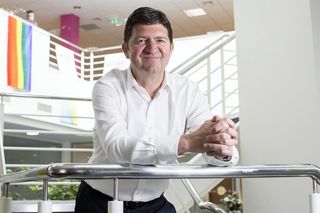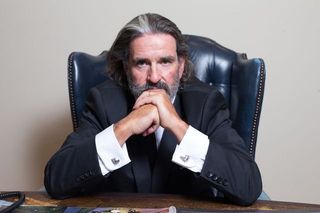'What you see out there can't be unseen' - Riverdance mogul John McColgan shares his moving portraits of the people of Palestine and Guatemala
Moved by his experiences as a Trócaire ambassador, Riverdance mogul John McColgan took his camera to Gaza and Guatemala to capture the realities of life for their peoples

In a quiet office off Dublin's Capel Street, John McColgan is talking animatedly on the phone. I peek my head around the door and he smiles and waves, mouthing apologies and telling me he'll be with me in "just one minute". I have a nosey around his office: a beautiful old tramway building that is home to the Riverdance headquarters.
Posters of the show and dancers in full flight adorn the walls, awards twinkle in dark corners alongside pictures of McColgan with actors and politicians - it's an office that wears success like a shiny new coat, without the smug attitude.
Moments later, McColgan (left) ushers me in. Dapper in a crisp white shirt, he is engaging and friendly, ignoring my proffered hand to give me a kiss on the cheek. The 72-year-old reminds me of Richard Attenborough, all twinkly-eyed and magnanimous. His voice has a gentle, measured lilt and, as we chat, it strikes me that for all his artistic merits he has not allowed success go to his head. An award-winning producer and director, McColgan is probably best-known as co-creator of that seven-minute interval performance at the 1994 Eurovision Song Contest that sent ripples around the world and subsequently became the Riverdance stage show, now in its 23rd year and grossing nearly €20 million in sales.
But today, he is more interested in discussing his new book, Looking at the Same Moon, a collection of photographs he has taken in his role as ambassador for Trócaire and the Oscar Romero fund, set up in 2016 in honour of the archbishop who became the voice of the oppressed people in El Salvador and paid the ultimate price when he was assassinated in 1980.
Photo by John McColgan, from 'Looking at the Same Moon', a book of photos by the Trocaire ambassador to raise funds for the charity
McColgan hopes the book will shine a spotlight on the lives of people living in conflict in Israel and Guatemala, and raise funds to help the families affected.
He is extremely proud of his work with Trócaire, an organisation that now employs 400 people in 20 countries around the world. "Most of us associate Trócaire with the charity box on the counter but what a lot of people don't know is how incredible they are in their efforts to address the humanitarian issues in countries affected by poverty, conflict and human rights abuse. They make a difference and they need support," says John emphatically.
His involvement with Trócaire stemmed from the documentary This Is Palestine that he and his brother, Gerry, produced with the charity to mark the 50th anniversary of the military occupation of the West Bank.
He had completed the Howth Horizons photography exhibition in aid of the RNLI and felt confident that a book of photography could help raise awareness for Trócaire. "As trite as it may sound, I've always believed that if you're as fortunate as we are to be well, able-bodied and living in a country like this, it's important to give back. What you see out there can't be unseen; it's so deeply touching and you feel an obligation to do all that you can to help. I felt I could try to empathise with these people and capture their stories."
The ability to capture the stories and emotions of people caught in the crossfire of conflict is no mean feat, and McColgan has managed to do it with the sensitivity and touch of an expert photographer, which he assures me he is not. He is simply "passionate", spending a lot of his time with award-winning photographer Peter Gordon, whom he considers a mentor.
"I didn't know before I went how to photographically capture the lives of these people or the atmosphere of these places. But I think I have some ability to have empathy with people and make them feel relaxed. I had thousands of photos, but it wasn't until I got back and Peter and I went through them that we realised the stories were in the portraits." He points to a striking image of a Bedouin man (top) with gentle yet piercing eyes and a haunted look of someone living in fear of Israeli occupying forces that threaten their very existence.
Protests at the trial of an Israeli man charged with burning a 15-year -old Palestinian boy to death in a local park. He got a life sentence.
If McColgan seems nonchalant about helming his first photography book, it's probably because his career has been a chequered history of roles that span the gamut of media. At 14, he bought his first camera in Woolworths for 10 shillings and sixpence, a quarter of his weekly wage. He has always had a "grá" for the visual.
The eldest of nine, as a young boy his dad would bring him on the back of his bike to see Hop-Along Cassidy or he would sneak off to the movie theatre on his own to dream about being a film star. He always thought he'd be an actor some day. It's never too late, I suggest. He laughs in agreement but, it wouldn't surprise me: just another notch on McColgan's well-worn success belt.
"I was in a youth drama group called the Young Dublin Players," he recalls, "before I got my break in RTÉ at the age of 17 as a vision mixer."
He does regret not doing radio, however. "Oh, wait," he laughs. "I forgot I actually did that."
A dyed-in-the-wool Elvis fan, he admits that "everything changed" when Elvis came into his life. While Radio Luxembourg belted out Heartbreak Hotel, he was busy saving for the twin turntables and flashing lights that would see him through his Blue Diamond Disco phase with regular DJ gigs in The Green Lounge (now Shanahans on the Green) and various locations around Dublin, eventually leading to him presenting Saturday Spin on RTÉ in 1968.
He later became Head of Light Entertainment at RTÉ and recalls with great enthusiasm those early days of television. "It was exciting and I was at the core of it, working with Gabriel Byrne, Cyril Cusack and Siobhán McKenna. I loved the travel shows with Mike Murphy; we had great fun," he smiles.
Memories: In 2013, former Guatemalan dictator General Jose Efrain Rios Montt was convicted in 2013 of genocide of the Ixil, a Mayan Indian community whose villages were wiped out by his forces. John says: "The women, in effect, were punished for their husbands attempts to exert their land rights. The disappearances of their husbands and the violence they experienced were used to deter other indigenous farmers from pursuing land claims. In the 30 years since the crimes were committed the women have had to bear their suffering in a profound silence." Pictured is Carmen de Paz Quisque.
It was here, in 1981, that he met his second wife, Moya Doherty, now Chair of RTÉ. They both decided to move to the UK, where John became Controller of Programming at TV-am, heading up the popular breakfast show.
They eventually moved home to start their own independent television company, Tyrone Productions. McColgan has always had this innate belief that things would work out, something he attributes to his mother, who never gave him a reason to doubt himself. It's not arrogance but a quiet self-assurance.
"I just loved her on so many levels," he says gently. "She didn't have much of an education but she was so clever, she could have been a psychologist. She had huge emotional intelligence and was so even-handed with us all. At night-time, she would go around all the beds saying, 'I love you, a ghrá, you're the best boy in the whole world.' I heard that every night and it's a mantra that I carry in my heart and soul that I believe has contributed to my confidence and the image I have of myself."
Is there anything he fears? "You prepare as best you can," he says with hollowed-out zen. "Invest as much of yourself as you can in something and then empower other people - pick the best people - and believe in yourself."
It's a good recipe for success, one he has honed since he began at RTÉ all those years ago, and one that has reaped huge rewards.
"It's a combination of serendipity, experience and talent," he offers, somewhat modestly, of the Riverdance success story. The show, currently in its 15th year at the Gaiety Theatre, will also be celebrating its 25th anniversary in 2020; it has reached over $20 million in sales and shows no signs of losing its worldwide appeal. "It's a bit of 'right place and right time'," says McColgan. "But I will say that we have a very focused and defined culture within the company. Part of that is treating the performers and people with respect and dignity, and expecting 100pc from them in return."
It comes as no surprise to learn that his professional motto is 'every night is opening night'. McColgan can stand in the back of theatres in China, Germany, America or the UK and every performance is opening night. He remembers living in London with Moya and going to see a long-running show on Broadway and thinking that, despite the performers being word perfect, they weren't present. "I remember thinking how awful that was and promising myself that if I was ever responsible for a long-running show, nobody could ever say that about it," he adds, a little irked.
It may be that what John learned and felt from his mother has passed along the line to his Riverdance family. "I do talk to the performers about who we are, what they represent, pride in our country and ourselves. They take that on board and they're invested in the show. I say to them, 'I can direct you and light you on stage but when the theatre goes dark and the lights go on, you're on your own. You have a gift - a theatrical alchemy - and when you're not connected to the audience 100pc, they know it.'"
He put the same McColgan 'recipe' into The Pirate Queen, which is why it came as a blow when the show sank under a wave of bad reviews, a surprise after the success of its predecessor. "It's like being pregnant for five years and then somebody telling you your child is ugly," he sighs, and then laughs out loud. It was unfortunate, he says, that following standing ovations every night, it only took a bad review from The New York Times to "sink the ship". But, he continues with that pragmatism, "You dust yourself off and get back on the horse."
After 50 years in the business, McColgan has developed a thick skin, something that has served him well as ambassador with Trócaire. But, even for the thickest-skinned among us, it would be hard not to feel 'changed' after seeing the atrocities he has seen. "I didn't feel changed, I felt enriched and humbled by the dignity, integrity and passion of these people in the most outrageous circumstances," he says.
McColgan has been known in the past for his love of working with women, citing them as superior to men. "It sounds like reverse sexism," he laughs. "It honestly didn't dawn on me until someone suggested I should consider hiring some men."
It is the women he has encountered on his trips that he remembers most. They are the ones most affected by the conflict in these war-torn countries and they are the glue holding communities together. That harmonious, enabling spirit is usually something women can do better. "It really is," he agrees. "When I was in Haiti, you'd see men lying around sleeping while the women did the work and held the families together."
This was the case wherever he went. In Guatemala he describes the "internal stoicism" of the women whose husbands and sons had been murdered in the genocide of a 30-year civil war. "There were no tears; they would just relay their stories."
Is it a hardness born from years of abuse and lack of respect, I wonder? "No, it's resilience and a cultural thing. There's a degree of acceptance about what's happened. They don't have any choice: they must carry on for the children that are left."
In Israel, women are not cowering in the corners; they are the protesters, taking risks every day to fight for justice. It must be hard to find the positives in places where change is slow and sometimes impossible. "What is wonderful is the strength of these people and of the volunteers. People like Sister Bridget Tighe, a nun from Sligo who is doing incredible work with the women and children in Gaza. There's always hope."
McColgan is a glass-half-full kind of person; I can't imagine many things annoy him but he admits that laziness, indiscipline and people not giving their best are top of the list. Is he a hard taskmaster? "More of benign dictator," he laughs, with that twinkly charm. Luckily, he didn't listen to the advice of one RTÉ Radio personnel officer in 1963 who told him he'd never make it in television because he had no education.
It is clear McColgan was very much the master of his own fate, willing to take risks and push himself out of his comfort zone. "My only regret is not directing movies. I think I would have been good at that." I wonder how he would fit it in, given his present schedule that includes overseeing the current Riverdance run at the Gaiety; the 25th anniversary of the show in the O2; a touring version of the show in Radio City Music Hall in 2020; his latest spectacular, Heartbeat of Home; working on an animated version of Riverdance with the Canadian company responsible for Despicable Me and Minions, and a new film for Trócaire that will air on YouTube. It makes me feel like a tired slug.
He does manage to find some downtime, he assures me, and with that he whips out his phone with boyish enthusiasm to reveal a photo of his four-year-old granddaughter, Lola, who he minds once a week.
If he had some advice for young Lola? "Never give up," he answers. "It helps that I love my job and working with creative people, but I think of those people in these countries I've recently visited, their resolve and their courage: that's inspiring."
There is nothing about McColgan that reeks of entertainment imperialism. He is measured, self-deprecating and down to earth. It seems like a good moment to ask him how he'd most like to be remembered after he's gone. "As someone who always did their best," he smiles.
'Looking at the Same Moon' can be purchased for €25 plus postage by contacting (01) 629 3333 or info@trocaire.org. All money goes directly to Trócaire
Join the Irish Independent WhatsApp channel
Stay up to date with all the latest news















